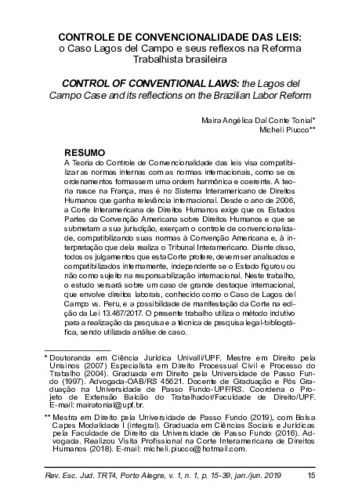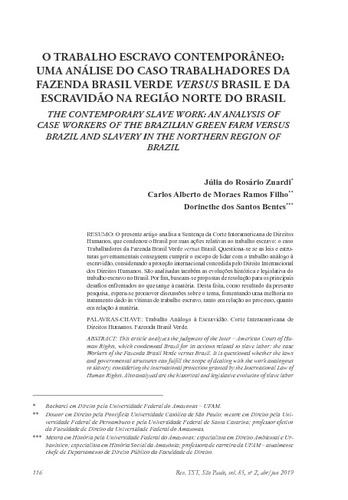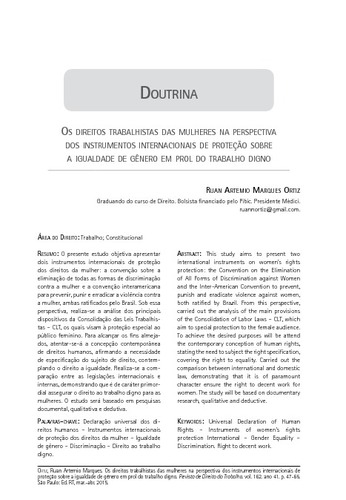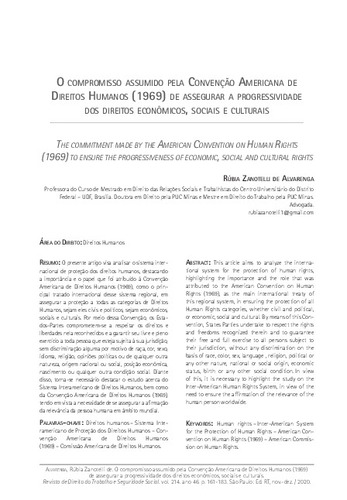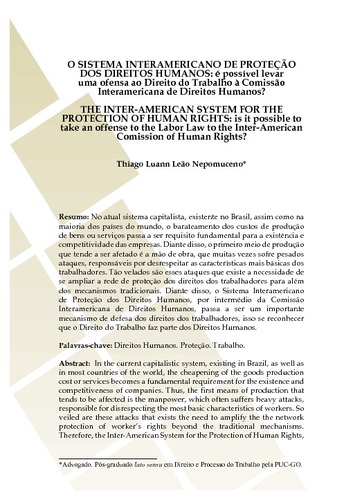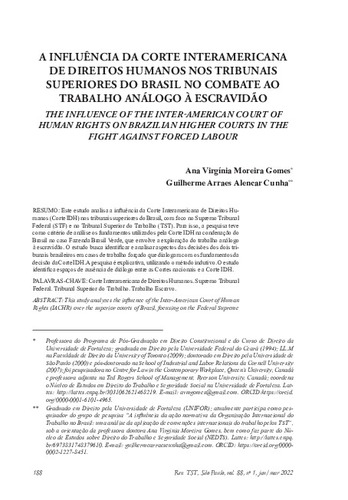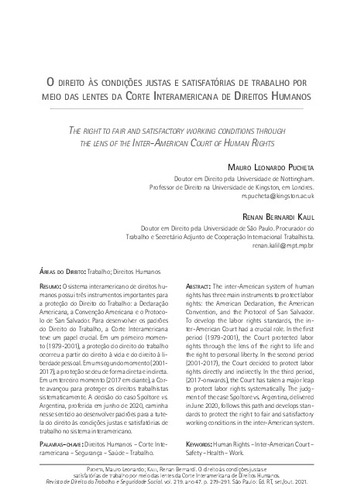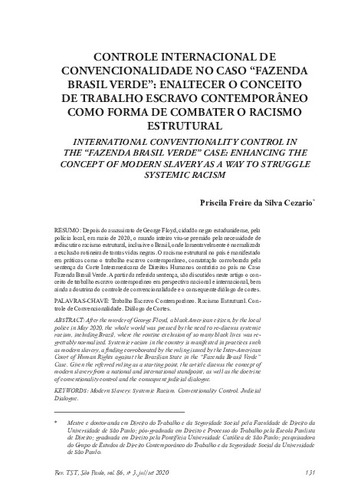Artigo de periódico
A jurisprudência da Corte Interamericana de Direitos Humanos como paradigma interpretativo no combate e prevenção do trabalho escravo contemporâneo no Brasil
| dc.contributor.author | Rocca, Lady Ane de Paula Santos Della | |
| dc.contributor.author | Benacchio, Marcelo | |
| dc.date.accessioned | 2025-04-02T15:21:27Z | |
| dc.date.available | 2025-04-02T15:21:27Z | |
| dc.date.issued | 2024-06 | |
| dc.identifier.citation | ROCCA, Lady Ane de Paula Santos Della; BENACCHIO, Marcelo. A jurisprudência da Corte Interamericana de Direitos Humanos como paradigma interpretativo no combate e prevenção do trabalho escravo contemporâneo no Brasil = The jurisprudence of the Inter-american Court of Human Rights as an interpretative paradigm in combating and preventing contemporary slave labor in Brazil. Revista do Tribunal Regional do Trabalho da 8ª Região, Belém, v. 57, n. 112, p. 127-152, jan./jun. 2024. | pt_BR |
| dc.identifier.uri | https://hdl.handle.net/20.500.12178/247937 | |
| dc.description.abstract | [por] Analisa a persistência do trabalho escravo contemporâneo no Brasil, a despeito dos compromissos assumidos pelo país em âmbito nacional e internacional, sobretudo diante dos casos noticiados pela mídia em 2023 envolvendo algumas vinícolas renomadas do Rio Grande do Sul e o festival de música Lollapalooza, na cidade de São Paulo. Embora as estatísticas oficiais demonstrem um aumento significativo do número de trabalhadores resgatados no primeiro semestre de 2023, evidenciando que de 1º de janeiro a 14 de junho a quantidade de resgates foi praticamente o dobro do número registrado em todo o primeiro semestre do ano anterior, a Justiça do trabalho brasileira ainda é relutante em aplicar as normas internacionais e as decisões da Corte Interamericana de Direitos Humanos (Corte IDH), o que pode constituir um dos fatores contributivos para a manutenção do ciclo da escravidão contemporânea no país. A implementação efetiva do controle de convencionalidade, além de uma obrigação dos juízes e tribunais, constitui um recurso indispensável para o aprimoramento da proteção dos direitos humanos, o que impõe, no contexto do trabalho escravo contemporâneo, a necessidade de se adotar uma abordagem preventiva, alinhada às tendências internacionais, que vise evitar a reincidência de violações, em contraste com a tradicional ênfase reparatória. A incorporação dessas práticas preventivas não apenas ressalta a responsabilidade do sistema judicial, mas também reforça a necessidade de aprimorar continuamente os mecanismos de proteção dos direitos humanos, especialmente no contexto laboral. Visa-se compreender o papel do poder judiciário no combate ao trabalho escravo contemporâneo, bem como examinar a necessidade de exercício do controle de convencionalidade e da utilização da jurisprudência da Corte Interamericana de Direitos Humanos na fundamentação das decisões judiciais pátrias, especialmente no que diz respeito às medidas para prevenção de novas violações. Para tanto, adotou-se a metodologia de pesquisa qualitativa e exploratória, mediante revisão bibliográfica, complementada pela análise documental, incluindo legislação, jurisprudência, relatórios de órgãos internacionais e nacionais e relatos de casos divulgados em fontes de notícias. | pt_BR. |
| dc.description.abstract | [eng] This article examines the persistence of contemporary slave labor in Brazil, despite the commitments made by the country nationally and internationally, particularly in light of the cases reported by the media in 2023 involving some renowned wineries in Rio Grande do Sul and the Lollapalooza Music Festival in São Paulo. Although official statistics show a significant increase in the number of rescued workers in the first half of 2023, with the amount of rescues nearly doubling from January 1st to June 14th compared to the entire first semester of the previous year, the Brazilian labor court still hesitates to apply international norms and decisions from the Inter-American Court of Human Rights (IACHR), which may contribute to the maintenance of the cycle of contemporary slavery in the country. The effective implementation of conventionality control, as well as an obligation of judges and courts, is an indispensable resource for enhancing human rights protection, which imposes, in the context of contemporary slave labor, the need to adopt a preventive approach aligned with international trends aimed at preventing the recurrence of violations, in contrast to the traditional emphasis on reparations. The incorporation of these preventive practices not only underscores the responsibility of the judicial system but also reinforces the need to continuously improve mechanisms for protecting human rights, especially in the labor context. The present study aims to understand the role of the Judiciary in combating contemporary slave labor, as well as to examine the need for the exercise of conventionality control and the use of jurisprudence from the Inter-American Court of Human Rights in the rationale of domestic judicial decisions, especially concerning measures for preventing new violations. To this end, a qualitative and exploratory research methodology was adopted, through a bibliographic review complemented by documentary analysis, including legislation, jurisprudence, reports from international and national organizations, and case reports disseminated in news sources. | pt_BR. |
| dc.description.tableofcontents | Trabalho decente e o compromisso brasileiro -- O trabalho escravo contemporâneo e os casos noticiados no Brasil em 2023 -- A Corte Interamericana de Direitos Humanos (Corte IDH) e o dever de prevenção integral -- A jurisprudência da Corte IDH como paradigma interpretativo para as decisões nacionais | pt_BR |
| dc.language.iso | pt_BR | pt_BR |
| dc.relation.ispartof | Revista do Tribunal Regional do Trabalho da 8ª Região: vol. 57, n. 112 (jan./jun. 2024) | pt_BR |
| dc.subject | Corte Interamericana de Direitos Humanos | pt_BR |
| dc.subject | Trabalho escravo, Brasil | pt_BR |
| dc.subject | Trabalho decente, Brasil | pt_BR |
| dc.subject | Poder judiciário, Brasil | pt_BR |
| dc.subject | Controle de convencionalidade, Brasil | pt_BR |
| dc.title | A jurisprudência da Corte Interamericana de Direitos Humanos como paradigma interpretativo no combate e prevenção do trabalho escravo contemporâneo no Brasil | pt_BR |
| dc.title.alternative | The jurisprudence of the Inter-american Court of Human Rights as an interpretative paradigm in combating and preventing contemporary slave labor in Brazil | pt_BR |
| dc.type.genre | Artigo de periódico | pt_BR |
| dc.identifier.rvbisys | in00001449593 | |
| dc.relation.ispartoflink | https://hdl.handle.net/20.500.12178/244796 | pt_BR |
Ce document figure dans la(les) collection(s) suivante(s)
-
Artigos9566



